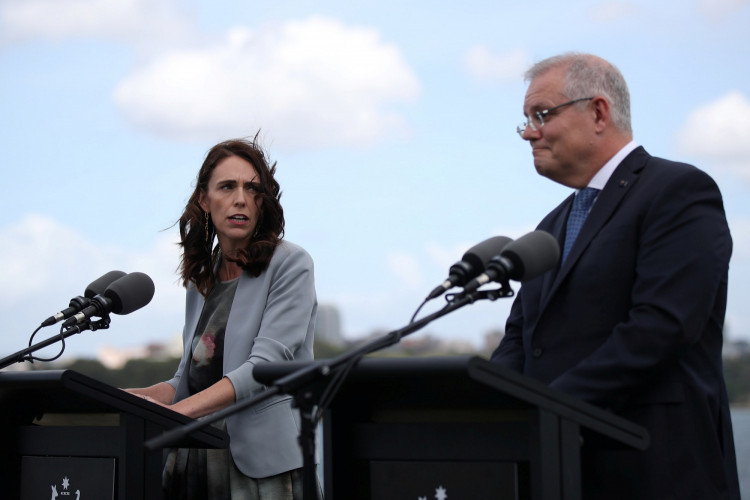Coronavirus and China topped the agenda during a face-to-face meeting between the prime ministers of New Zealand and Australia Monday. Both countries said they had "grave concerns" over developments in Hong Kong and the human rights situation in the Xinjiang region of China.
In the first face-to-face meeting between heads of both countries in over 15 months, Australia and New Zealand presented a united front on China.
Quarantine-free travel between Australia and New Zealand began last month after both nations controlled the spread of COVID-19, allowing Australian Prime Minister Scott Morrison to visit New Zealand.
Talks concentrated on China, with Australia currently at loggerheads with that country while New Zealand has strengthened economic ties and free trade.
Australia's ties with China have deteriorated since Australia supported an independent inquiry into the origins of the COVID-19 pandemic.
China has in recent months moved to restrict imports of Australian products such as barley, wine and beef, with the World Trade Organization saying last week it would establish a dispute settlement panel to resolve the barley row.
In a recent editorial China state-controlled newspaper Global Times said "it is true that economic and trade cooperation between China and New Zealand has been moving forward on a steady and healthy footing." It added that a trade deal "is bound to benefit New Zealand exporters of agricultural, dairy and seafood products amid deepening bilateral economic ties. If anything, such development only makes Australian politicians more envious and frustrated, because their government has consistently refused to make any real move to ease tensions with China."
New Zealand's approach to China has led to suggestions by political commentators and the news media that Wellington may not be taking a strong enough stance on China's human rights' issues. Ardern rejected this, saying New Zealand and Australia had similar positions on issues such as trade and human rights.
"You'll see Australia and New Zealand have broadly been positioned in exactly the same place on these issues consistently so I really push back on any suggestion that we are not taking a strong stance on these incredibly important issues," she said in a joint news conference Monday after the talks.
Morrison backed Ardern, saying Australia and New Zealand were trading nations, but neither would ever trade its sovereignty.
"I think as great partners, friends, allies and indeed family, there will be those far from here who would seek to divide us and they will not succeed...," he said.
In a joint statement both prime ministers expressed grave concerns over developments in Hong Kong and the human rights situation in the Xinjiang region of China, and called on Beijing to respect the human rights of the Uighur people and other Muslim minorities and to grant the United Nations and other independent observers unfettered access to the region.
Experts said how the two countries managed their relations with China had been a point of contention.
As well as being the first in-person meeting between the two leaders in more than 15 months, the talks were also the first visit of a world leader to either since both countries shut their borders.
Analysts at Wellington's Victoria University said both leaders tread carefully in discussing how they deal with China. "I think both countries want to avoid perceptions of a growing gap on China. But while there will be plenty of talking points...to emphasize Australian and New Zealand common approaches and cooperation, Morrison's visit won't transform some of the well-established perceptions out there of divergence, including on China issues," Robert Ayson, a professor of strategic studies at the university said.
Public opinion on how New Zealand has been handling China has become increasingly vocal. Australian media has been continually blasting New Zealand and its attitude toward China. A journalist with Australia's AM Show told New Zealand to "grow up" and stand united with the country and its stance with China.
"New Zealand needs to get over the notion that China is its friend. China is not its friend, China is its customer and that's how it should be treated, that's how it should remain and that's how Australia is treating it," AM Show correspondent, Jason Morrison, said.
A video published by 60 Minutes Australia last week, which has since gone viral on social media, accused New Zealand of abandoning Australia to earn "a fast Chinese buck."
Despite the growing pressures from Australian media, New Zealand has by contrast enjoyed relatively warm relations with China - its largest trading partner. New Zealand has taken some similar stances to Australia on China, including banning Huawei from its 5G network rollout but it has generally stayed clear of openly criticizing China over sensitive issues such as Taiwan, the COVID-19 origins, Hong Kong and the country's alleged crimes against humanity in Xinjaing.





